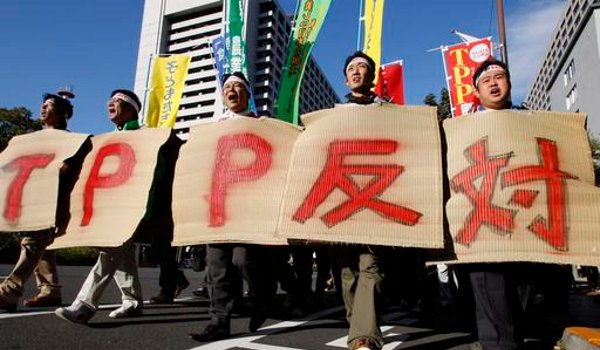As the US begins a series of consultations in Japan to assess the country’s readiness to join the Trans-Pacific Partnership free trade agreement, Japan finds itself with no shortage of people to annoy.
If Japan succeeds in joining the TPP, which requires gaining the approval of all nine currently negotiating countries, including the US, it risks outraging its powerful agricultural lobby. Under the terms of the TPP, Japan would have to eliminate the hefty tariffs it charges on agricultural imports. That would decimate agriculture here, at least in the short-term.
Japan also risks irking its rising power of a neighbor, China, if it joins the TPP. The US-supported TPP, which China will not be eligible to join in the near future due to strict stipulations on labor standards, intellectual property and capital accounts, is a clear American move to strengthen its position in Asia and contain a booming China. China, never keen on being contained, is not likely to miss the signal Japan sends by joining the TPP.
However, if Japan decides to drop out of TPP negotiations, it will face happier farmers and a more cheerful China but a worsened relationship with America. Japan’s most powerful business lobby, Keidanren, which has lobbied hard for the country to join the TPP, will also not be pleased.
Although bringing Japan, whose economy is 2.5 times the size of the other Asian TPP states combined, into the agreement would certainly help the US establish a stronger position in Asia, America isn’t blind to Japan’s position. At a conference for business leaders in Tokyo last week, Assistant US Trade Representative Wendy Cutler emphasized that the US does not want to be seen as pressuring Japan to join the TPP while domestic debates still smolder. For the TPP to work, said Cutler, “you need trading partners who are there at the table for their own thoughtful nationally debated reasons of their own choosing.”
So what’s a poor (or at least economically stagnant) archipelago to do? There’s no question that Asia has become more closely economically integrated in the last decade through a multitude of preferential trade agreements and is likely to continue on this path. Expanding cross-Pacific free trade is written in the tea leaves as well. Joining some sort of Pacific Rim free trade agreement makes economic sense for Japan.
Free trade is generally a good thing—good for business, good for national economies, good for economic growth—and it doesn’t make long-term economic sense for Japan to continue protecting its aging farmers with massive tariffs on imported agricultural products. That kind of protectionism is short-sighted, especially considering the average Japanese farmer is in his or her sixties. But as it considers the TPP, Japan must decide what is worth protecting: its agricultural sector and its never-too-warm relationship with China or its exporters and importers and its relationship with the US.
Likewise, if it wants to cement its role as a major player balancing Chinese power in the Asia Pacific, the US is no doubt using the current round of consultations to assess Japan’s ‘readiness’ to join the TPP to also discern Japan’s ability to withstand annoyance from both its agricultural sector and the rising (already risen?) giant next door.
No matter what the outcome of Japan’s TPP negotiations, someone’s going to get irritated. Who Japan ultimately decides to annoy will tell you a lot about the bets it wants to place in the current power games of the Asia Pacific.









